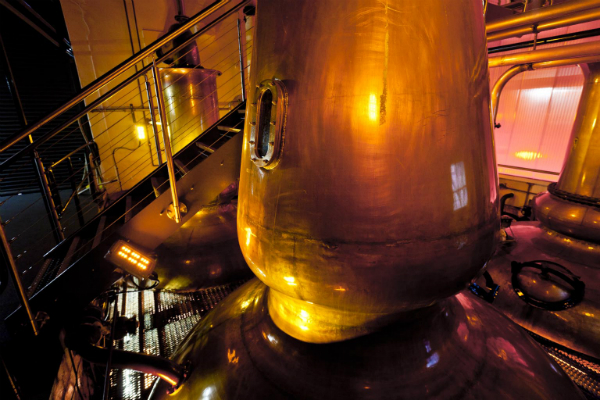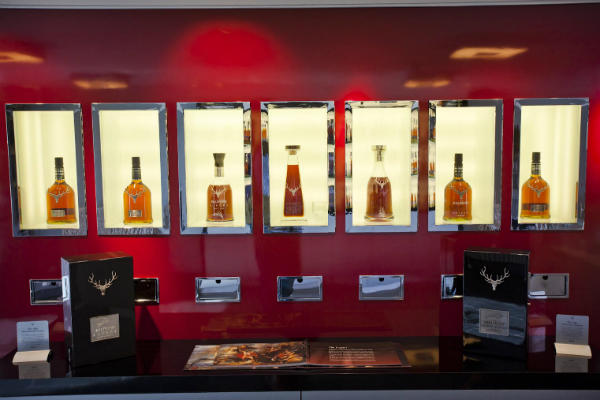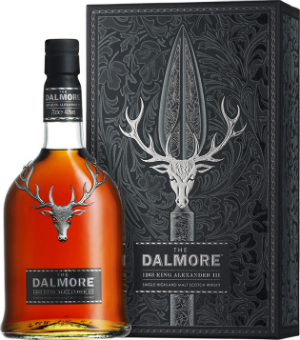The plane is long and thin, just two seats either side of the aisle. It’s as we soar over Northern England that the plane starts to rock and sway; bad weather in the Scottish borders has led to the kind of turbulence that makes you close your eyes and grip the seat (if not the passenger next to you), and pray for meteorological equilibrium. The lads in the seats directly across from me have pre-emptively ordered two bottles of Bell’s apiece, and sit back looking serene, as I gulp helplessly and dream of solid land. Eventually we glide out of the bad patch of weather and a sense of calm is regained, but the experience leaves me a little jumpy and desperately in need of a calming, soothing dram.

As we glide down through the glens that surround Inverness, I’m reminded of the stark, rugged beauty of the highlands; purples meld with browns and deep greens to provide an electric vista that is not seen anywhere else on earth. The landing is smoother than you might have reasonably expected; relief and joy at making it back to earth are emotions that immediately come to mind. We have a short drive to Ardtalla, our base for this eagerly anticipated trip to The Dalmore distillery. The approach to Ardtalla is arresting. This beautiful lodge forms the central part of the vast Novar Estate which has been in the Munro-Ferguson family since the early 18th century when it was bought by Scottish nobleman Sir Hector Munro on his return from travels with the East India Company. The estate offers shooting, fishing and other country pursuits, as well as hosting weddings and parties across the 20,000 acres available. The lodge is beautiful – rooms fan out around a central light-filled atrium. Furnishings manage to seem light and modern whilst maintaining an appropriate level of tradition. We settle into large, airy bedrooms with warm wooden floors and curved, freestanding baths – it feels lovely.
The retirement to sleeping quarters is short-lived though; before long we’re back in the mini buses and making the short distance to The Dalmore. The distillery, one of the most highly rated and internationally loved in the northern highlands sits on the edge of Cromarty Firth, a starkly beautiful arm of Moray Firth, which is empty at this time of the year, except for inexplicably melancholic oilrigs. The Dalmore distillery was established here in 1839 by Alexander Matheson who eventually sold it to the Mackenzie Clan in 1886, and it is the Mackenzie family motto that The Dalmore still uses – luceo non uro (I shine not burn). The story reaches back far further though. Legend has it that the reason The Dalmore is able to use the royal emblem of the twelve point antler is that in 1263, a predecessor of the Mackenzie family saved King Alexander III from a painful goring at the antlers of a stag – the legend is honoured in the form of The Dalmore King Alexander III bottlings – a whisky of inimitable charms that we’ll come onto later. The Dalmore is owned today by Whyte & Mackay, one of the most important names in Scottish distilling, and a company who have worked extremely hard to maintain levels of quality and uphold tradition at the distillery. The Dalmore is exported to all the world’s major cities and is enjoyed by millions every year, but it should be noted that annual production stands at a (in whisky terms) relatively small 70,000 cases (The Macallan makes around 8 million by comparison).

The distillery is small and comparatively unchanged by time and technology. Some of the copper stills in which the whisky comes to life have been here for over a hundred years and most of the systems still rely on human dexterity rather than complex computer programs. Master distiller Richard Paterson is something of a legend in whisky circles, he has held the position of Master Distiller at The Dalmore since 1970 and the distillery would never have achieved the heights it has without his stable hand.
After our tour of the warm, beer and dark wood smelling corners of the distillery and the damp warehouse where the barrels lie maturing, we are led upstairs to the tasting rooms – one of the few areas of the distillery to have received a significant facelift, something it needed, to engage the interest of super-rich international clients who like to arrive by helicopter and enjoy private tastings of rare bottlings. The Dalmore has a strong profile in the super-premium end of the spirits market and is particularly adored by those looking for incomparable rarity, due to the fact that it holds a fascinating library stock of ancient vintages, ‘The Constellation Collection’, and rarest blends in the form of ‘Most Exclusive’ bottles. The Dalmore was recently named the number one investment grade whisky, with investors seeing strong returns on their purchases.
We begin our tasting on a high note, with a generous, sociable dram of The Dalmore’s premium bottling, King Alexander III – its ‘flagship’ whisky if you will. The whisky starts its maturation in old bourbon casks, before moving through the following: Matusalem oloroso sherry woods, Madeira barrels, Marsala casks, port pipes and Cabernet Sauvignon wine barriques. I’ve never tasted a whisky that’s moved about quite as much, but the results are extraordinary: the whisky is robustly-flavoured with notes of orange, bitter chocolate, Arabica coffee and Christmas pudding. The finish is deep and resonant, but with uplifted fruit and a commendable sense of freshness. Conversation starts to flow between the assorted journalists and the charming folk from The Dalmore; with whisky in the blood there’s a lot to say.

The tasting is illuminating in the way it clearly communicates the range and singular qualities of each whisky. Some love the highly-rated 15-Year-Old, others , the slightly esoteric Cigar Malt; for me though the whisky from the classic range that stands out is the 18-Year-Old, which spends fourteen years lying in white oak ex-bourbon whisky casks, before spending a final four in 30-year-old oloroso sherry casks. Where the King Alexander III was marked by its multi-layered fruit and rounded finish, the 18-Year-Old is much more spicy and toffee-laden. The finish is enduring and extremely spicy and rich – it’s an exquisite whisky.
Later we return to the Novar Estate and our Ardtalla lodgings. We are a little weary, but warmed by a succession of superb malts, we’re ready to sink into a relaxing evening of food, wine and easy conversation. Just before I leave the sitting room to retire for a bath, Rob Bruce, charismatic global head of PR for The Dalmore mentions that he’s got something a little special for us to taste before dinner, something outside the classic range, a whisky for careful consideration. He disappears, only to reappear moments later with an elegantly lacquered box. The Dalmore Ceti – 30-Year-Old. This is not a whisky many will ever get to taste. Bruce informs us that the only place in the UK you could currently get hold of a taste is The Connaught, where a 50cl dram will set you back £250. The whisky is aged for 23 years in white oak, ex-bourbon casks, before moving into 30-year-old, oloroso sherry casks from top producer Ganzalez Byass. The Ceti pours lighter than some of the younger whiskies; its extended ageing has softened it, mellowed it, leaving something truly incredible. On the palate the liquid is smooth, sweet and rounded. Spice, vanilla and honey come together harmoniously and linger in the mouth and the mind for an absurd length of time. I marvel at the completeness of the whisky, it has everything.
I retire and run my bath. I still have half a glass full of The Ceti – I want to enjoy it in silence, lying in the peat marked water. Bathing is a luxury that generally eludes this flat-dwelling Londoner; bathing with The Dalmore’s Ceti in hand is a luxury that eludes just about everyone. I look out from my window across the rugged landscape, now dusky and distant, and concentrate on the precious liquid in my hand that so clearly speaks of the landscape and its waters. This is perhaps the most hedonistic connection one might ever find with nature. I drain my glass and immerse myself fully in Scotland’s wild waters – luceo non uro.
The Dalmore Distillery Dalmore Distillery, Alness, Ross-shire, Scotland, IV17 0UT 01349 882 362 www.thedalmore.com
Novar Estate, Evanton, Dingwall, Ross-shire IV16 9XL. Tel: +44 (0)1349 831062 Fax: +44 (0)1349 830880 enquiries@novarestate.co.uk



